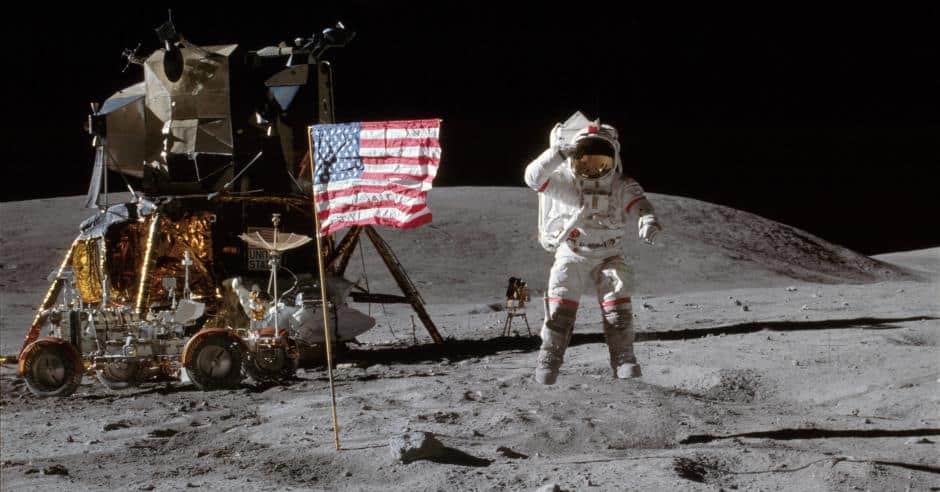“This is one small step for a man, one giant leap for mankind.” ~ Neil Armstrong, the first man who set foot on the moon.
On this day in 1969, the United States had created history by reaching the peak of technological achievement. President Kennedy was successful in landing a human on the moon. The whole country celebrated this moment cheerfully. With years of determination and hard work, the team of scientists, astronauts, engineers, and manufacturers could make this finally happen. This day set an example for team spirit in the entire world.
With a never-ending competition in the business world, the marketers can borrow many ideas from this historical moment. It serves as an unbeatable model to meet the unreachable goals and bring your dream into reality. Neil Armstrong, Buzz Aldrin, and Michael Collins are the most visible figures of this project. Besides, the Apollo 11 program also consisted of thousands of other people who strived hard to achieve this goal.
Let’s take a look at the extraordinary experiences of the Apollo 11 team and see how it helps the marketers in their venture.
1. Plan Plan Plan
Do you have a plan for your business? If not, you have to make one. Planning forms the basis of any project. One has to invest some time to plan their task before leaping into it. Without a proper plan, your time and effort may go wasted. Though there was a shortage of time for the NASA team, they did not skip this step. They invested a great deal of thought into this process. If they ignored planning, the history might have turned out to be different.
The team had a thorough plan beforehand. The project managers broke the complex task into smaller steps to have a better focus. They planned to execute this impossible dream in different phases such as flying to the moon, orbiting it, and landing an uncrewed craft. It not only helped the team to ease their task but also made them confident enough to believe in this dream. So, gather your group, discuss and set a plan accordingly.
2. Study Your Plan
Once, your team sketches a final draft of the plan, do not forget to study it before proceeding with the next step. Examining your plan helps you in identifying the flaws as well as risks involved. Before beginning with the project, the mission planners at NASA rigorously studied the lunar surface for two long years.
With the help of high-resolution and close-up photographs taken by the Lunar Orbiter satellite and the Surveyor spacecraft, the team searched for the best place for the landing. Also, they had to consider the amount of sunlight to determine the best time. Once the team was evident about the plan, they began their venture. Hence to execute a successful marketing campaign, one has to study every single aspect mentioned in the program.
3. Be Ready to Modify the Strategy
It is not necessary that everything should execute as per the plan. In a few cases, the team may have to reshuffle or recreate the scheme for the company’s betterment. Don’t lose hope in such scenarios. The way you deal with the hardships clearly shows how you are going to succeed in the future. Speak to your team, invest some extra time in determining the modified plan and start executing it without wasting a minute.
The dream of President Kennedy would not have come true if Armstrong and Aldrin did not act accordingly to the situation. Though the team had drawn a well-set plan, they had to modify it in the last moment of their journey. The lunar module’s computer faced overloading problem because of incoming data and task. It threatened to reboot in the middle of their planned sequence. But the team did not give up. Instead, Armstrong took charge of semi-automatic control of the lunar module, whereas Aldrin provided him with the altitude and velocity data. Finally, they landed on the lunar surface with only 25 seconds worth of fuel left.
4. Examine the Risk Involved
Every great dream come with the set of risks to handle. Similarly, the Apollo 11 mission was one among them. It included technical risks as well as human errors. But the NASA team acknowledged the impending dangers and was prepared with the backup plans. If they did not come up with Plan B, the execution of this mission would have remained impossible forever.
Likewise, every marketer should have back up plans in case of failure. They must study each risk involved in their path and be ready with the solution. Don’t let the risk pull you away from reaching your goal. Also, the team members must undergo training regarding the upcoming dangers. The NASA project saw significant failures in almost every mission. But the team was able to figure them out and take the necessary actions.
5. Strong Team Communication
The team communication was just as important as the science behind the Apollo program. As all know, this program consisted of thousands of people other than astronauts, scientists and project leaders. Hence, a friendly team communication was essential to keep up with the plan and avoid costly errors. To handle large members, they broke their team into the smallest based on the priority of the task.
Also, the leaders of the various teams met every week to discuss their progress, efforts, and even challenges. So, every member was aware of the team whereabouts. Communication played an essential role in this mission. Without proper communication between the team, one cannot dream a reality. So, you must plan well on this part to make sure your business is running smoothly. Besides, you must also remind your team members that you share the same goals and continuously keep them motivated to achieve it.
6. Entrustment
Businesses ignore this point in most of the cases. Entrustment or delegation brings you the better result than you expected. The Apollo team managers encouraged this by allowing the fresh candidates to handle a few of the task. The average age of the operation team was 26, and most of them were just out of their colleges. But, the team gave them the freedom to solve the problems regardless of their experience and saw a remarkable output.
Similarly, the businesses can break their complex tasks into simpler ones and assign them to the inexperienced candidates. Though it is tempting to involve only experts in your marketing strategies, why don’t you try this for yourself and study the outcome? With proper support and resources, the curious and fresh mind may come up with an innovative solution for your business challenges.
7. Learn from The Mistakes
Mistakes are the stepping stone to success. Don’t be shy to make an error while trying different strategies in your business. Although NASA had big minds and experts in their team, they were never afraid of committing errors in their Apollo journey. Instead, they recorded the mistakes in their every step and learned from this process.
Implement this step in your business and reap maximum benefit. Arrange a team meeting, study the recorded mistakes in the previous tasks, and discuss the solution with the members. A non-judgmental discussion of errors will help your team members to speak about it and also to find an answer boldly.
8. Embrace the Competition and Deadlines
Competitions have become a part of every business around. The Apollo mission was not left out from this factor. With no pressure or race with the USSR, the landing on the moon would not have happened at all or would have taken a longer time than the deadline. Hence the drive or an urgency to make your dream happen plays an essential role in achieving it.
“I think we’re going to the moon because it’s in the nature of human beings to face challenges.” ~ Neil Armstrong
Whereas, the deadline builds a pressure within you to speed up your process wisely. When Kennedy announced about this mission, he put a timeline on it. He declared by the end of the decade you will see a man landing on the moon. Accordingly, in 1969, Apollo 11 landed successfully with still six months remaining to reach the deadline. Hence never fear your competition or deadline. Instead, treat this as an impetus to meet your target.
9. Celebrate the Victory
Do not forget your team members once you meet your goal. They have equally strived hard to make your dream come true. So, share the applause and celebrate the victory with your team. With tremendous success in the mission, the astronauts did not forget to mention the efforts of other team members at every opportunity. Also, the country celebrates the victory of Apollo 11 Mission every year.
Now, the United States Mint is getting ready with a particular coin for the 50th anniversary of the first moon landing in 2019. Follow the footsteps of the Apollo program and make your team members happy. Everyone loves to receive a pat on the back after accomplishing a goal. Acknowledge the work of individual and spread the joyful moment in your organization.
10. Repeat
Never stop once you accomplish your goal. Something significant might be waiting for you in your next mission. The United States followed the same principle. They did not stop after their Apollo 11 program. Instead, six other Apollo missions landed men on the lunar space beginning with this success. Besides, the country also focused on numerous uncrewed landing on the moon. It is not an end; it is just a beginning which laid the foundation to explore the earth’s neighbor in the not-too-distant future.
This lesson will create a massive change in the business world. While technology is evolving in a neck break speed, the marketers must never put an end to their innovative strategies. They must cultivate the productive mindset and repeat the business task thoroughly. Since they have the clear picture of their previous accomplishment, the team must improvise the tactics for their next project. There should not be a thing called stopping when it comes to innovation and marketing strategies.
“People ask, ‘What’s the best role you’ve ever played?’ The next one.” ~Kevin Kline
Wrapping Up
The list keeps growing as there are hundreds of lessons to learn from this historical moment. But, not to forget, the human left his footprint in the lunar soil regardless of the risks involved. Millions of people all around the globe watched his steps on the television. The vision of President Kennedy finally saw success. Though landing on the moon seemed outlandish, the determination of Apollo team made it happen in less than a decade.
Hence aim high and fly with the colorful wings regardless of the headwind on your way. Never give up on your failure, instead, dream big and bring your business to the top list.






